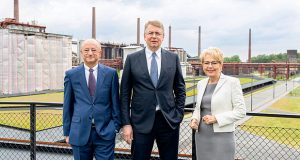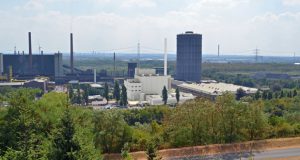German lignite will continue to make an important contribution to maintaining a secure, economical and sustainable energy supply, the chair of the board of German Lignite Association (DEBRIV), Helmar Rendez, explained at this year’s lignite convention in Cologne/Germany. The German lignite industry calls for planning security and political reliability up to the end date for coal use proposed by the commission for growth, structural change and employment. By the end of 2038 the viability of the industry and the mining districts must be preserved, says Rendez. Compared with the current district planning, the commission’s recommendations represent a significant reduction, resulting in major structural adjustments in the regions and serious disruptions to the companies’ activities and plans.
Rendez appealed to all those responsible, particularly in economic, energy and environmental policy, not to underestimate the risks of undesirable developments. The fourth largest national economy equally needs safety, cost effectiveness and environmental protection in its energy supply. A reliable power supply without interruptions 365 days a year needs reliable generation capacity such as lignite has been offering for decades. Despite high and increasing supply, the guaranteed power supply from photovoltaics and wind is still between zero and 1 % of the demand. Moreover, it is unlikely that storage capacities for a 14-day cold period of little sunlight and no wind can be developed and made available within the next ten years. By 2023, however, it can be expected that domestic power generation capacities will no longer be sufficient to cover high network loads.
“As long as we use lignite, we will have a dampening effect on electricity prices,” explains Rendez on the economic importance of generating power from lignite. Particularly in an increasingly difficult economic environment, the appreciation of lignite’s contribution will rise again, Rendez adds.
With regard to climate policy, German lignite has already “delivered” according to the chair of the DEBRIV board. Since 1990, CO2 emissions from lignite have decreased by approximately 50 %. Even in the future, coal-based power generation will remain “100 % compatible with European climate protection goals”.
The next step is to implement the recommendations of the commission for growth, structural change and employment on a secure political foundation with regard to energy and the environment. According to the chair of the DEBRIV board of executives, the commission’s proposal to forgo new open-pit mines for energy use does not extend to existing plans as part of the states’ landmark decisions or lignite plans, and ongoing or planned relocations must also be carried out. Under no circumstances may the commission’s recommendations be undermined by new regulatory interventions regarding energy and the environment. Premature decommissioning must be compensated for appropriately by negotiation; this also applies to open-pit mines. To safeguard a secure and cost-effective energy supply, DEBRIV considers realistic revision clauses and transparent reviews of decisions indispensable. To develop sustainable prospects for the regions, active mining as an industrial docking site is vital.
Domestic lignite production was 2.9 % lower in 2018 than in 2017. A total of 166.3 Mt of raw lignite was mined. Production in the Rhineland decreased by 5.4 % to 86.3 Mt. Production in Lusatia fell by 0.8 % to 60.7 Mt. By contrast, the central German mining area recorded an increase in production of 2.2 % to 19.2 Mt. The changes are largely in line with developments in the supplies to power stations. Lignite power generation amounted to 145.5 bn kWh, 2.9 % less than in 2017 and the sixth consecutive year of decline. The number of employees in the German lignite industry decreased slightly by 0.2 % to 20,851.
In the first quarter of 2019, lignite production and supply to power stations was nearly 18 % lower than in the same period of the previous year. Therefore, approximately 7 Mt less CO2 was emitted. This development is mainly due to three factors: The transfer of additional power station units to the emergency pool of reserve power, a significantly increased supply of wind energy and the effects of the reduced production caused by stopping the clearing of Hambach Forest. (DEBRIV/Si.)


